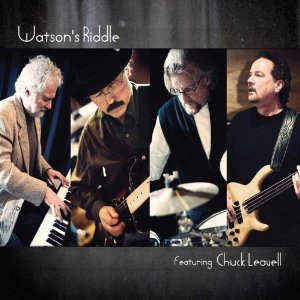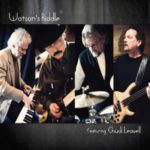
Palmetto Records
Though he’s best known for adding jazzy fills to The Rolling Stones’ stadium-size rock shows and The Allman Brothers Band’s blues-based improvisational rock, keyboardist Chuck Leavell has quietly maintained a second career as a fusion player for the past 35 years. Beginning The Allman Brothers Band side project We Three and continuing through the classic, late ‘70s fusion ensemble Seal Level and his freer work with Randall Bramblett, Leavell has consistently returned to the jazz/rock style when left to his own devices.
While their sound veers closer to modern jazz than Miles Davis-style fusion, in many ways Watson’s Riddle is the latest platform for the type of playing Leavell first introduced to Allman Brothers Band in the ‘70s. A local super group led by Uptown South Carolina resident—and longtime LA session guitarist—Steve Watson and founding Marshall Tucker Band drummer Paul Riddle, Watson’s Riddle formed after one of Watson’s students— cardiothoracic surgeon Douglas Appleby—encouraged him to write music that was “emotionally engaging, relaxing and transforming to the human soul.” Using elements of the light jazz that has provided the soundtrack to countless doctors’ offices over the past few decades as jumping off point, Watson listened to Appleby’s suggestion and coated his batch of songs with a more groove-driven sound with the help of Riddle, Leavell and Marshall Tucker Band bassist Tim Lawter.
Clocking in at just under an hour, Watson’s Riddle, the group’s self-titled studio debut, captures the relaxing, soulful sound the group initially rallied behind. But thanks to the jam-based backgrounds of the group’s core players, Watson’s Riddle feels like a natural extension of the boogie-oriented, southern fried-jazz Leavell has toyed with for many years. Opening with “Days Ahead,” a flowing, guitar showcase that introduces Watson’s jazz-rock tone and consummate playing, Watson’s Riddle plays the blueprint for their “after hours” doctors’ music sound: a mix of short grooves punctuated by tight horn solos and carefully pronounced percussion.
The not-so secret ingredient is the chemistry between Leavell and Riddle. Given that Riddle has been a close friend of The Allman Brothers Band camp for decades—and even subbed for Leavell’s Sea Level partner Jamie in the ABB for a spell in the ‘90s—it makes sense that the album’s rhythm section at times recalls energy of The Allman Brothers Band’s Brothers period. The limber “In the Moment,” which marries guest alto saxophonist Will Compton’s punchy horn solos with Leavell’s boogie-oriented piano player, is the album’s funkiest track while the more refined “Somewhere In The Night” captures the twilight of a summer night. As its title suggests, “Free to Be” is among the album’s freest tracks, featuring some organ work from Leavell But the melodic, piano-showcase “Unrestrained Escape” many be the album’s true centerpiece, a slow, loose, mixture of smooth jazz and heavy fashion that captures the group’s original goal.



No Comments comments associated with this post